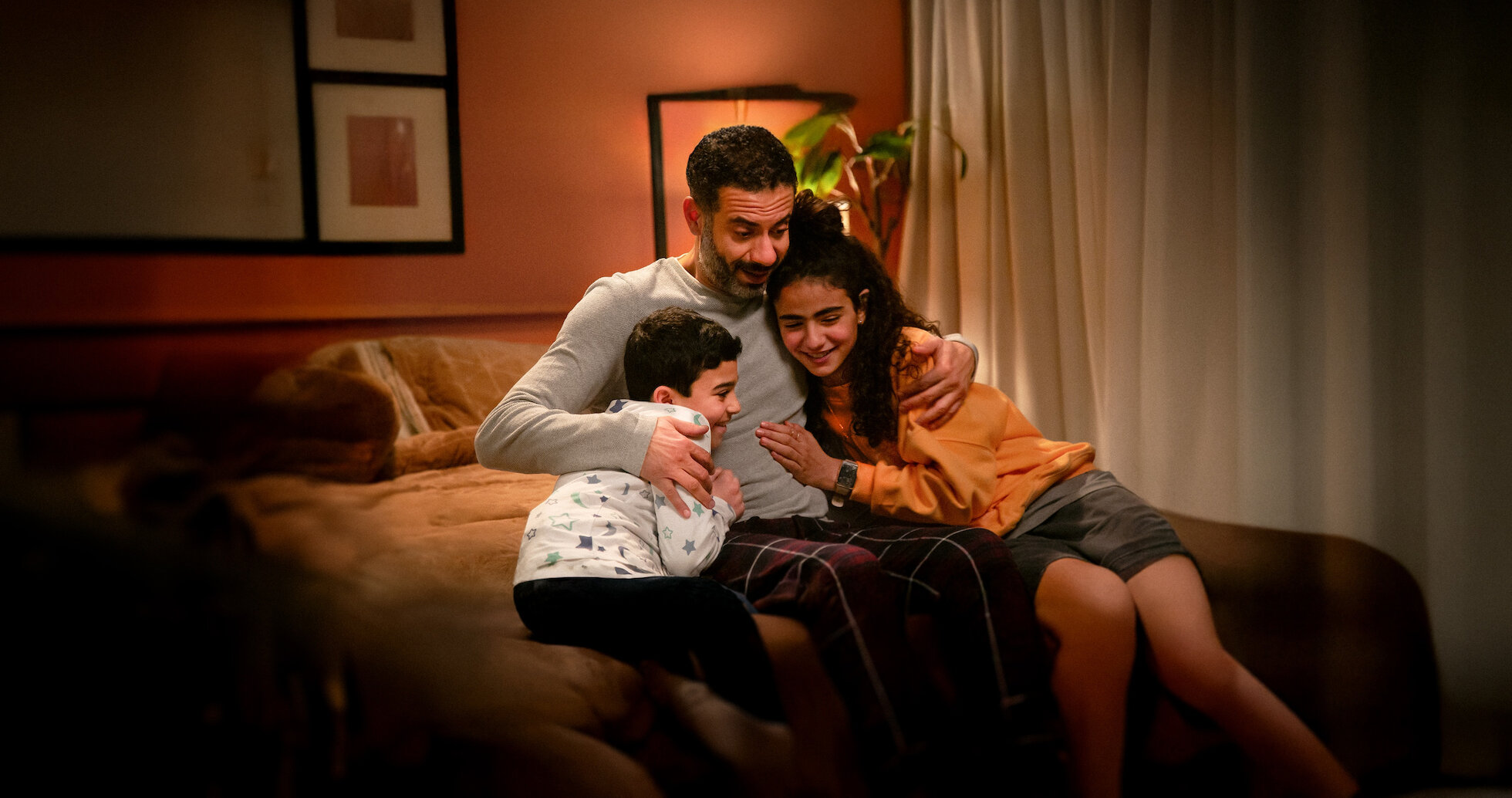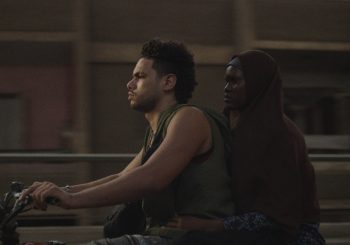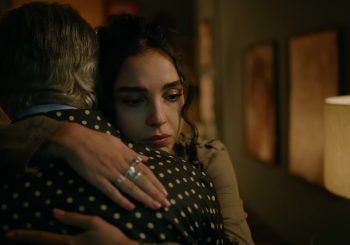In the summer of 2025, Netflix released Catalogue – an Egyptian family drama that dares to explore one of life’s hardest experiences: the loss of a parent. The series follows Youssef (Mohamed Farrag), a workaholic father suddenly thrust into single parenthood after his wife Amina’s untimely death.
But Catalogue isn’t just about Youssef’s grief as a widower; it’s about what comes after – the messy, chaotic, and heartwarming journey of learning to truly be a parent. As a person who lost her own father at the age of 12 – around the same age as the show’s teenage daughter Karima (played by Retal AbdElaziz) – I watched Catalogue through tears and smiles, finding that its story hit painfully close to home.
A Heartfelt Tale of Loss, Love, and Learning
Catalogue begins with a tragedy: Amina (Riham Abdel Ghafour), the mother of two young children, passes away after a battle with cancer. Her death leaves behind a shell-shocked family; a husband who thought providing material comfort was enough, and two kids who suddenly need their emotionally-distant dad more than ever. Youssef quickly realizes he has been an absent father, especially as he discovers his ignorance of his son’s severe allergy. Youssef’s journey to become a better father is filled with endearing, sometimes comical, first attempts. He struggles with tasks as simple as braiding his daughter’s hair or packing school lunches, fumbling in ways that are both funny and heartfelt. In fact, the premise itself carries a touch of bittersweet comedy: Amina, it turns out, was a parenting vlogger who left behind a whole channel of “how-to” videos for raising children. Desperate to bridge the gap between him and his children, Youssef starts binge-watching his late wife’s cheerful tutorials.
It’s a moving twist, a husband learning how to parent from the very person he’s lost.
Despite its tragic premise, Catalogue is far from a melodrama. There are no over-the-top breakdowns or drawn-out weepy monologues. Instead, the show’s tone is understated and relatable, sometimes to a fault. Scenes of grief are often interwoven with the mundanity of daily life: making breakfast, doing homework, and school drop-offs. This quieter approach highlights a truth that many who’ve lost a loved one might recognize: even when your world has shattered, everyday life doesn’t stop. Bills still need paying, kids still squabble, and mornings still come with blaring alarms. Catalogue captures this reality by showing Youssef and his children trying to resume a routine, even when they’re grieving.
In one early episode, we see Karima (played by Omar Beialy) back at school and Mansour at his football practice shortly after their mother’s funeral, and outwardly, everything appears “normal.” The family almost carries on. As a viewer who has been in these children’s shoes, I found these moments simultaneously recognizable and jarring. At 12 years old, I, too, returned to school soon after my father’s death, and I remember the strange dissonance of sitting in math class while my heart was quietly breaking. Catalogue gets this half-right: it understands the surreal normalcy that follows tragedy, but it sometimes glosses over the deeper turmoil beneath the surface.
Grief Behind the Smiles: How Real Is Catalogue’s Grief?
One of the bold choices Catalogue makes is to handle grief with a delicate touch – perhaps a bit too delicate.
The series wraps its heaviest topics in soft lighting, clean camera shots, and often a resolutely hopeful mood. As a result, the pain of loss is present, yet often muted. Characters say they are grieving, but aside from a few teary eyes and a somber montage or two, the show resists diving into the darker sides of bereavement. We hear that the family misses Amina, but we rarely see sleepless nights, breakdowns, or the kind of emotional volatility that many real grieving families experience. The flashbacks to Amina’s illness are also surprisingly tidy: although Amina died of cancer, we get only fleeting glimpses of her struggle. Even Youssef’s own grief is often channeled into action: learning to cook, for instance, rather than raw sorrow.
Having lived through a parent’s death, I have mixed feelings about this portrayal. On one hand, I appreciated Catalogue’s avoidance of melodrama; the grief in this story is quiet and persistent rather than explosive, which rings true in its own way. There’s a scene where Youssef stands alone in his bedroom, surrounded by his late wife’s belongings, unsure how to act. He eventually just breathes in the scent of her scarf and blinks back tears – a subtle moment that said more to me about loss than any dramatic crying fit could. On the other hand, I couldn’t help but think of myself, who didn’t have it as “together” as Karima seems to. In real life, grief can knock the wind out of a teenager; I struggled with my schoolwork, my mood, even my sense of security after my dad died. Catalogue largely avoids showing its young characters in such distress except in minor instances.
Yet, perhaps Catalogue’s optimism serves a purpose.
The show gently asserts that grief doesn’t have to mean endless despair; healing is possible, and there is light at the end of the tunnel. This message comes across in Youssef’s gradual progress; two steps forward as a dad, one step back in his private sorrow, and in the way the children slowly warm up to laughter again. The truth is, everyone copes differently. Some, like Karima, may dive back into normalcy as a coping mechanism, using routine as a safe harbor amidst the emotional storm.
It Takes a Village: The Power of Support
One of the most uplifting aspects of Catalogue is its emphasis on community and support. Youssef may be at the center of this story, but he is far from alone in his struggle. The series surrounds the family with a colorful cast of relatives, friends, and helpers. Each of these characters offers something different to the healing process, and as someone who has relied on others to get through grief, I found this element both realistic and heartwarming.
First, we meet Om Hashem, the nanny Youssef hires to keep the household running. Played by veteran actress Samah Anwar, Om Hashem is the opposite of the stereotypical prim-and-proper TV nanny. She’s no-nonsense, witty, and unmistakably Egyptian – the kind of caretaker who will serve you a home-cooked meal while scolding you for not eating enough. Her introduction brings much-needed levity: she marches into the chaotic home like a drill sergeant with a heart of gold, making the children giggle and even getting Youssef to crack a smile.
Youssef’s own side of the family steps up, too. His older brother Hanafy (Khaled Kamal) might not be onscreen as much, but his presence looms large in the story – he’s the one who quietly checks that bills are paid and the fridge is stocked, freeing Youssef to focus on the kids’ emotional needs. Every grieving family needs a Hanafy, the practical helper in the background, and I remembered with gratitude the neighbors and family friends who took care of little things for us when my dad died. Catalogue shows that support isn’t always grand gestures; often it’s the small acts – a dinner dropped off, a ride to practice – that carry a family through.
Interestingly, one of the most impactful supporting characters is an outsider to the family: Miss Howaida, the children’s schoolteacher. Portrayed by Tara Emad, Howaida is gentle, empathetic, and observant. She offers the kind of support teachers often do – and she extends that care to Youssef as well. Some of my favorite scenes are the quiet conversations between Youssef and Miss Howaida, where she shares a memory of Amina or encourages Youssef to attend a school event for Karima. In those moments, you sense a hint of warmth that could potentially grow into romance. The show wisely keeps this dynamic subtle – Catalogue isn’t about romance or replacing Amina, but it does acknowledge that new friendships (and maybe future love) can blossom from tragedy.
Growth, Mental Health, and Moving Forward
At its heart, Catalogue is not just about coping with death; it’s about learning how to live again. Over eight episodes, we witness remarkable growth in Youssef, who once could barely tell you his children’s favorite colors, and becomes a fully engaged father. He learns to listen to his kids, to support them, and to share with them – fulfilling his wife’s wish and proving to himself that he can fill, however imperfectly, the void Amina left.
The children, too, show signs of growth.
Karima, who initially keeps her feelings tightly bottled (perhaps to avoid burdening her struggling dad), gradually opens up. She starts the series barely speaking to Youssef – more comfortable confiding in her diary or her teacher – but ends it by sharing a heartfelt conversation with him at her mother’s favorite spot in the house.
Mansour, who is younger and more demonstrative, goes from being a boy who constantly asks when mom will come back to one who, with his father’s help, begins to understand that she’s gone but not forgotten. His nightmares subside, and he even dedicates his next football win to his mom’s memory in a tear-jerking little speech.
Catalogue emphasizes “coping, not forgetting” at every turn. Amina remains a very real presence in their lives – through her videos, through stories the family tells, through the values she instilled. The show’s characters don’t erase her; they carry her with them, which is one of the healthiest messages a story about grief can deliver.
As Catalogue draws to a close, it leaves us not with a grand resolution, but with a sense of cautious hope. There is no “fixed” family – Youssef will always miss Amina, and the children will have moments where their loss aches anew. The show wisely includes a final scene of the family visiting Amina’s grave on Karima’s birthday, tears and smiles intermingling. But, there is a feeling that this family will be okay. They have come to understand that grief is a journey, not a destination, and they are walking it together. Watching that, I felt a lump in my throat and a warmth in my heart, because that’s exactly the lesson it took me years to learn after losing my dad. You never truly “get over” such a loss – you grow around it. You find new sources of joy, you allow new people into your life, and you carry your loved one with you in everything you do.
In the end, Catalogue succeeds as a heartfelt tribute to the resilience of families. It may not capture every aspect of grief perfectly (no show can), but it resonates in its honesty and its optimism. It shows an Egyptian family confronting tragedy without losing their love or their light. It shows a father remaking himself for the sake of his kids – and in the process, discovering depths of emotion he didn’t know he had. And for me, it affirmed something I’ve come to know in my own life: Grief is the price you pay for love, and it’s a price I’m willing to pay.







Comments (0)